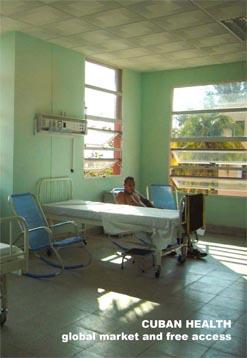Cuban Health - Global market and free acces

Students: Yvonne Meier, Fabian Valverde
Location: Group work in Havana
Date: June, 2007
Type: Research project, student work, health and education
Health, education (and culture) were since 1959 the strategic backbones of the social policy of Cuba. The organization of these fields in very strongly centralized for the whole country, the urban metropolises as well as rural areas. They are based on ‘free access for all’ where every Cuban citizen would have equal access to benefits. With the ‘First Educational Revolution’ following the 1959 events, an alphabetization campaign was carried out, bringing Cuban society to the point of having no illiteracy, on the level of developed countries such as Switzerland. A nine-year compulsory education financed by the state was introduced. In Havana, both health and education domains are a well-organized grid of services thoroughly covering the city. Medical services and education are free, medicines subsidized by the state and affordable to citizens. Today we can observe and interesting disproportion: while in many domains such as housing, transport or commerce, city operates in an exceptional low standard mode, in the fields of health, education, and partly culture, high urban standards are achieved, even an international competitive position.
Periodo especial was a catalyst for another reform of health and education fields, a ‘second revolution’. For the last six years the Cuban leadership was actively promoting a strategy known as the ‘Battle of Ideas’ with ideological overtones pointed against the United States. The ‘Battle of Ideas’ is a massive investment in health, education and cultural development as well as a revival of socialist economic methods. In addition, there is a major effort to combat corruption and theft of social property. This strategy demanded doubling of existing achievements, such as doubling of the number of classrooms and the amounts of educated doctors and teachers. New facilities for education and training of ‘emergency’ medical personnel and teachers are notable among the rare public investments in Havana today.
More than a factor of social and political stability, health and education policies have become Cuba’s export products. In recent years 20.000 Cuban doctors are sent to Caracas, Venezuela in exchange for oil and credits. Special plans for higher income housing of returning doctors (but also sportsmen), exist in Havana. Health tourism is a well-established field in Havana, for instance Operacion Miracolo, since 1.5 years facilitates rehabilitation of people with eyesight problems in a former leisure area in the west of Havana called the Marina Hemingway.
Brain drain in Cuba presents a danger, but is countered by restrictions on movement of professionals. This ‘unexpected success’ of Cuban health and education system in a society otherwise pressured by crisis is the main focus of our critical investigation.
Download the Book PDF

